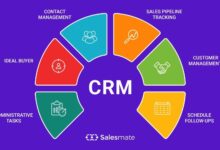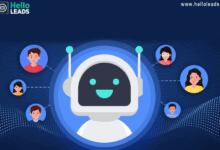CRM with AI Chatbot Integration
CRM with AI Chatbot Integration represents a significant advancement in customer relationship management. By seamlessly blending the power of a CRM system with the intelligence of AI-driven chatbots, businesses can revolutionize how they interact with customers, streamline operations, and ultimately boost profitability. This integration offers a potent combination, leveraging the structured data management of CRM with the personalized, readily available communication of AI chatbots.
This synergy unlocks several key advantages. Improved customer service is achieved through instant responses and 24/7 availability. Lead generation and qualification are enhanced by intelligent chatbot interactions that pre-qualify prospects. Sales teams benefit from increased efficiency, freeing them to focus on complex deals. Data analysis and reporting are also significantly improved, providing valuable insights into customer behavior and preferences. Ultimately, this integration leads to stronger customer relationships and a more data-driven approach to business.
Defining CRM with AI Chatbot Integration
Customer Relationship Management (CRM) systems are foundational tools for businesses of all sizes, designed to manage and analyze customer interactions and data throughout the customer lifecycle. Effective CRM streamlines processes, improves customer service, and ultimately boosts sales and profitability. Integrating AI-powered chatbots significantly enhances these core capabilities, creating a more efficient and customer-centric experience.
AI chatbot integration adds a layer of intelligent automation to traditional CRM functionalities. This automation improves response times, personalizes interactions, and provides valuable data insights, leading to more effective customer engagement and business growth. By automating routine tasks and providing instant support, AI chatbots free up human agents to focus on more complex issues, increasing overall team productivity and improving customer satisfaction.
Core Functionalities of a CRM System
A CRM system typically includes functionalities such as contact management (organizing and storing customer information), sales force automation (automating sales processes), marketing automation (automating marketing tasks), customer service and support (managing customer inquiries and resolving issues), and reporting and analytics (tracking key performance indicators and generating reports). These core functionalities work together to provide a comprehensive view of the customer journey and facilitate better decision-making.
AI Chatbot Enhancement of CRM Capabilities
The integration of AI chatbots enhances CRM by automating customer interactions, providing 24/7 availability, personalizing customer experiences, and offering valuable data insights. Chatbots can handle routine inquiries, freeing up human agents to focus on more complex tasks. They can also personalize interactions by using customer data to tailor responses and offers. Furthermore, the data collected by chatbots provides valuable insights into customer preferences and behaviors, enabling businesses to make data-driven decisions.
Types of AI Chatbots Used in CRM
Several types of AI chatbots are used in CRM, each with its strengths and weaknesses. Rule-based chatbots follow predefined rules and scripts to respond to customer queries. These are relatively simple to implement but lack the flexibility to handle complex or unexpected situations. Machine learning (ML)-based chatbots learn from past interactions and improve their responses over time, providing a more dynamic and personalized experience. Natural Language Processing (NLP)-powered chatbots can understand and respond to human language more naturally, leading to more human-like interactions. Hybrid chatbots combine elements of rule-based, ML, and NLP approaches to achieve a balance between efficiency and flexibility.
Examples of Successful CRM with AI Chatbot Implementations
Many companies have successfully integrated AI chatbots into their CRM systems. For instance, a large e-commerce company might use an AI chatbot to handle order tracking and shipping inquiries, freeing up customer service agents to address more complex issues. A bank could use an AI chatbot to answer common questions about account balances and transactions, providing 24/7 customer support. A software company might employ an AI chatbot to qualify leads and schedule demos, streamlining the sales process and improving lead conversion rates. These examples demonstrate the versatility and effectiveness of AI chatbot integration in enhancing CRM capabilities across various industries.
Benefits of Integrating AI Chatbots into CRM
Integrating AI-powered chatbots into your CRM system offers a multitude of advantages, significantly enhancing efficiency, productivity, and the overall customer experience. By automating routine tasks and providing intelligent insights, these integrations unlock new levels of performance across various aspects of your business.
Improved Customer Service Efficiency is a key benefit. AI chatbots provide instant, 24/7 support, resolving simple queries and freeing up human agents to handle more complex issues. This leads to reduced wait times, increased customer satisfaction, and a more efficient use of your customer service team’s time.
Improved Customer Service Efficiency
AI chatbots dramatically improve customer service efficiency by providing immediate responses to common inquiries. This immediate response capability reduces customer wait times, leading to increased customer satisfaction. For example, a retail company integrating a chatbot into their CRM could handle basic order tracking, shipping updates, and return inquiries instantly, without requiring human intervention for these routine requests. This allows human agents to focus on more complex problems and personalized interactions, improving overall customer service quality. The result is happier customers and a more efficient customer service team.
Enhanced Lead Generation and Qualification Processes
AI chatbots can significantly enhance lead generation and qualification. By engaging website visitors in interactive conversations, chatbots can collect valuable lead information, pre-qualify leads based on predefined criteria, and route qualified leads directly to the sales team. For instance, a chatbot could ask potential customers about their needs and budget, identifying those most likely to convert into paying customers. This targeted approach saves sales teams time and resources, focusing their efforts on high-potential leads.
Impact on Sales Team Productivity
The integration of AI chatbots directly impacts sales team productivity by automating many repetitive tasks. Sales representatives are freed from answering routine questions and can focus their time on building relationships, closing deals, and strategically engaging with high-value prospects. This increased efficiency leads to improved sales performance and a higher return on investment. Imagine a sales team that previously spent significant time answering basic product questions; with a chatbot handling those inquiries, the team can dedicate more time to closing deals and building stronger customer relationships.
Better Customer Relationship Management
AI chatbots contribute to better customer relationship management by personalizing interactions and providing consistent, high-quality service. By analyzing customer data within the CRM, chatbots can tailor their responses to individual customer preferences and past interactions. This personalized approach strengthens customer relationships, fosters loyalty, and increases customer lifetime value. For example, a chatbot could remember a customer’s past purchases and offer relevant product recommendations or promotions, creating a more personalized and engaging experience.
Improved Data Analysis and Reporting
AI chatbots collect valuable data on customer interactions, preferences, and behaviors. This data, integrated into the CRM, provides actionable insights for improved decision-making. Detailed reports generated from chatbot interactions can reveal trends, identify areas for improvement, and inform strategies for enhanced customer service and sales performance. This data-driven approach allows businesses to continuously optimize their processes and improve customer experiences based on real-time feedback and analysis.
Implementation and Integration Challenges
Integrating AI chatbots into existing CRM systems presents several hurdles that businesses must overcome for successful implementation. These challenges range from technical complexities to strategic considerations regarding data security and the need for meticulous training. Careful planning and a phased approach are crucial for mitigating these risks and maximizing the benefits of AI-powered CRM.
Integration Difficulties with Existing CRM Systems
The seamless integration of an AI chatbot with a pre-existing CRM system can be surprisingly complex. Legacy systems, often built on outdated architectures, may lack the APIs or necessary infrastructure to support real-time data exchange with a modern chatbot platform. Data mapping and transformation are often required, potentially involving significant custom development to ensure compatibility. Furthermore, the integration process itself can disrupt existing workflows, requiring retraining of staff and potential downtime during the transition. For example, a company using a very old CRM system might find that its data structure is incompatible with the chatbot’s expected input format, necessitating extensive data migration and reformatting.
Data Security and Privacy Concerns
Integrating AI chatbots into CRM systems raises significant data security and privacy concerns. Chatbots process sensitive customer data, including personal information, purchase history, and communication logs. Robust security measures are paramount to prevent unauthorized access, data breaches, and compliance violations. This includes implementing encryption protocols, access control mechanisms, and regular security audits. Failure to adequately address these concerns can lead to reputational damage, legal penalties, and loss of customer trust. For instance, a healthcare provider integrating a chatbot for patient communication must adhere to HIPAA regulations, requiring stringent data encryption and access control measures.
Need for Robust Training Data
The accuracy and effectiveness of an AI chatbot are heavily reliant on the quality and quantity of its training data. Insufficient or poorly curated data can lead to inaccurate responses, frustrating customer interactions, and ultimately, a diminished return on investment. The training data must be representative of the diverse range of customer inquiries and communication styles the chatbot will encounter. Furthermore, regular updates and retraining are necessary to maintain accuracy and adapt to evolving customer needs and language patterns. A chatbot trained on limited data might struggle to understand nuanced queries or regional dialects, leading to unsatisfactory user experiences.
Selecting and Implementing the Right AI Chatbot
Selecting the appropriate AI chatbot for CRM integration requires a careful evaluation of several factors. These include the chatbot’s capabilities, scalability, integration options, pricing model, and vendor support. Businesses should assess their specific needs and priorities before making a decision. A phased implementation approach, starting with a pilot program in a limited area, can help minimize risk and allow for iterative improvements. Thorough testing and user feedback are essential to ensure the chatbot meets the desired performance standards and integrates seamlessly with existing CRM workflows. For example, a small business might start with a chatbot offering basic customer support features, gradually expanding its functionality as its needs evolve.
AI Chatbot Platforms for CRM Integration
The selection of a suitable AI chatbot platform is crucial for successful integration. Below is a comparison of some popular options. Note that pricing and features can vary significantly depending on the specific plan and customization.
| Platform | Features | Pricing | Integration Compatibility |
|---|---|---|---|
| Dialogflow (Google Cloud) | Natural language understanding, intent recognition, context management, integration with various platforms | Pay-as-you-go, various subscription tiers | Wide range of CRM platforms via APIs and integrations |
| Amazon Lex | Similar features to Dialogflow, strong AWS ecosystem integration | Pay-as-you-go, various subscription tiers | Strong integration with AWS services and various CRM platforms |
| Microsoft Bot Framework | Comprehensive bot development framework, integration with Microsoft services | Pay-as-you-go, various subscription tiers | Good integration with Microsoft Dynamics 365 and other platforms |
| ManyChat | Focus on Facebook Messenger integration, simpler interface | Subscription-based, various plans | Primarily integrates with Facebook Messenger and select CRM platforms |
Use Cases and Applications
AI chatbots integrated with CRM systems offer a wide range of applications across diverse industries, significantly enhancing customer service, operational efficiency, and sales processes. Their ability to handle routine inquiries, personalize interactions, and provide instant support makes them a valuable asset for businesses of all sizes.
The versatility of AI-powered chatbots allows for seamless integration into various business functions, leading to improved customer satisfaction and increased revenue generation. This section will explore specific use cases and demonstrate how these systems work in practice.
AI Chatbot Applications Across Industries
The application of AI chatbots within CRM systems spans numerous sectors. In e-commerce, chatbots can handle order tracking, provide product recommendations, and answer frequently asked questions about shipping and returns, freeing up human agents to focus on more complex issues. In healthcare, they can schedule appointments, send medication reminders, and answer basic health questions, improving patient engagement and reducing administrative burden. Within the finance industry, chatbots can assist with account inquiries, transaction confirmations, and fraud detection, enhancing security and improving customer service.
Scenario: AI Chatbot Handling Customer Inquiries
Imagine a customer, Sarah, contacts a clothing retailer’s website with a question about a recent order. The AI chatbot, integrated with the CRM, immediately identifies Sarah based on her account information. It accesses her order details within the CRM and promptly responds with the tracking number and estimated delivery date. If Sarah has further questions, the chatbot can access the retailer’s knowledge base for answers or escalate the inquiry to a human agent if necessary, providing a seamless and efficient customer experience. The entire interaction is logged within the CRM, providing valuable data for future analysis and improvement.
Workflow Diagram: CRM and AI Chatbot Interaction
Imagine a simple flowchart. The process begins with a customer initiating contact (e.g., through website chat, email, or social media). This input is routed to the AI chatbot. The chatbot analyzes the customer’s request using natural language processing (NLP). If the chatbot can resolve the issue using its knowledge base and the information available within the CRM (customer data, order history, etc.), it provides an immediate response. If the chatbot cannot resolve the issue, it escalates the request to a human agent, who can access the complete customer history within the CRM to provide a personalized and informed response. The entire interaction is recorded and stored within the CRM for future analysis and reporting.
Personalizing Customer Interactions with AI Chatbots
AI chatbots enhance personalization by leveraging CRM data to tailor interactions to individual customers. For instance, a chatbot can greet a returning customer by name and refer to their past purchase history. It can offer personalized product recommendations based on their browsing history and preferences. By analyzing customer data, the chatbot can anticipate needs and proactively offer assistance, creating a more engaging and valuable customer experience. This level of personalization fosters customer loyalty and drives sales. For example, an online bookstore’s chatbot could recommend books based on a customer’s past purchases and reading preferences, or suggest similar titles to those currently on their wish list, directly from the CRM data.
Future Trends and Developments
The integration of AI and chatbots within CRM systems is rapidly evolving, promising a future where customer interactions are more personalized, efficient, and insightful than ever before. This section explores key trends shaping the future of AI-powered CRM, focusing on advancements in predictive analytics, natural language processing, machine learning, and integrated AI tools.
Predicting Customer Behavior with AI-Powered CRM
AI-powered CRM systems are increasingly leveraging machine learning algorithms to analyze vast datasets of customer interactions, purchase history, and demographic information. This allows for the creation of predictive models capable of anticipating future customer behavior, such as churn risk, purchase likelihood, and product preferences. For instance, by identifying customers exhibiting patterns consistent with those who have churned in the past, a CRM system can proactively offer targeted retention strategies, such as discounts or personalized support. This proactive approach allows businesses to minimize customer loss and optimize resource allocation. These predictive capabilities are not just limited to identifying at-risk customers; they also extend to forecasting demand, optimizing marketing campaigns, and personalizing the customer journey at every touchpoint.
Natural Language Processing (NLP) and Enhanced Chatbot Capabilities
Advancements in NLP are significantly enhancing the capabilities of AI-powered chatbots integrated within CRM systems. NLP enables chatbots to understand and respond to human language in a more nuanced and context-aware manner. This means chatbots can move beyond simple keyword matching to comprehend the intent and sentiment behind customer inquiries, leading to more natural and engaging conversations. For example, NLP allows chatbots to understand the frustration in a customer’s complaint and respond with empathy and appropriate solutions, rather than simply providing generic answers. Furthermore, NLP facilitates the development of chatbots capable of handling complex queries, understanding different dialects and accents, and even translating languages in real-time, thereby broadening the reach and accessibility of customer support.
Impact of Machine Learning Advancements on Future CRM
Machine learning is the driving force behind the continuous improvement of AI-powered CRM systems. As more data is processed, machine learning algorithms become increasingly sophisticated in their ability to identify patterns, make predictions, and personalize customer experiences. For example, machine learning algorithms can optimize chatbot responses based on past interactions, ensuring that the chatbot continuously learns and improves its ability to provide helpful and relevant information. Furthermore, machine learning enables the development of self-learning chatbots that can adapt to changing customer needs and preferences without requiring constant human intervention. This leads to more efficient and effective customer service, as well as the ability to identify and address emerging trends and issues more rapidly.
Integration of CRM with Other AI-Powered Tools: Sentiment Analysis
Integrating CRM with other AI-powered tools, such as sentiment analysis, provides a holistic view of customer interactions. Sentiment analysis allows businesses to gauge the emotional tone of customer feedback, whether it’s from surveys, social media, or chatbot interactions. This information is invaluable for understanding customer satisfaction levels, identifying potential issues, and proactively addressing negative sentiment. For example, if sentiment analysis reveals a surge in negative comments about a particular product, the CRM system can alert the relevant teams to investigate the issue and take corrective action. This integrated approach ensures that businesses are not only responding to customer feedback but also actively anticipating and mitigating potential problems.
Brief for a Future-Forward AI-Powered CRM System
This future-forward CRM system will leverage advanced AI capabilities to provide a truly personalized and proactive customer experience. Key features will include: Predictive analytics to anticipate customer needs and proactively address potential issues; Advanced NLP-powered chatbots capable of handling complex inquiries and providing empathetic responses; Seamless integration with other AI-powered tools, such as sentiment analysis and social listening; A user-friendly interface that allows for easy access and analysis of customer data; and Robust security measures to protect sensitive customer information. This system will empower businesses to not only understand their customers better but also to build stronger, more lasting relationships. The ultimate goal is to create a system that anticipates customer needs, proactively addresses potential problems, and fosters a sense of loyalty and trust.
Last Word
In conclusion, integrating AI chatbots into CRM systems offers a compelling pathway to enhanced customer engagement, operational efficiency, and data-driven decision-making. While challenges related to integration, data security, and training data exist, the potential benefits far outweigh the risks. As AI technology continues to evolve, the capabilities of AI-powered CRM systems will only become more sophisticated, offering businesses even greater opportunities to improve customer experiences and drive business growth. The future of CRM is undeniably intertwined with the intelligent capabilities of AI chatbots.





